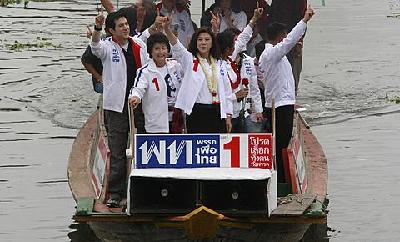Thailand is readying for general elections Sunday seen as marking a further test of country's democratic institutions. Opinion polls indicate a tight race, with about one third of voters still undecided. Thailand's recent troubled political past is weighing upon people's uncertainty in choosing the next leader in fragile economic times.

Adorning the walls of Na Buk's home in Baan Plah Kao in northeast Thailand are calendars, images of revered Thai King Bhumipol Adulyadej, marking each year.
This Sunday Na Buk, a retired domestic worker, will join 46 million other eligible voters in choosing a new government from more than 40 parties and some 3,800 candidates.
The prize is a place in the 500-seat parliament. Competition has been strong.
Regional interests
Surveys say the northeast provinces are a stronghold of the opposition Pheu Thai Party led by 44-year old businesswoman Yingluck Shinawatra, the sister of former prime minister and Thai telecom tycoon, Thaksin Shinawatra.
Fighting to make up ground is the governing Democrat Party of Prime Minister Abhisit Vejjajiva. Despite living in Pheu Thai's political heartland, Na Buk says she supports Mr. Abhisit.
Na Buk says she supports Abhisit because his government has helped local communities with funding and she believes he is a good person.
The election, the first since 2007, comes a year after Thai security personnel forced an end to two months of anti-government protests in Bangkok.
The rallies, led by pro-Thaksin United Democratic Front against Dictatorship (UDD) or red shirts, had attempted to force the Abhisit government from power by occupying the capital's main business district. Clashes between soldiers and protesters left more than 90 people dead and hundreds injured.
The Bon Gai community in central Bangkok was at the center of fighting.
Du, a street restaurant owner, says she cannot decide who she will vote for between the ruling party and the main opposition Pheu Thai. She says after the violence of a year ago she is tired of politics and fears the problems will persist even after the election.
Economic concerns
The Bon Gai community people say the main concern lies with the economy and rising food and fuel prices.
Yeng, a restaurant owner and Pheu Thai supporter, says life for the poor has been getting harder. He adds that past governments have ignored the poor. Prices of goods are rising and people do not have enough money. He says he hopes a new prime minister will solve the problems.
But after years of political conflict in Thailand fears remain that the election may fail to resolve the tensions in the country.
Chuwit Kamolvisit, the leader of the Rak Thailand (Love Thailand) Party and a former massage parlor owner turned politician, doubts the election will end the conflicts in Thai society, but it may ease the mounting pressures building over recent years.
"No it does not resolve anything," said Kamolvisit. "But it releases something. You know it is like a bubble. So what the election is for is to release some pressure in the Thai society and it is good. So the problem is we have two big parties - Pheu Thai and Prachatipat [Democrats] - they are fighting. They want to be the government, that is what they want to do."
Political strategy
The Democrat Party's has followed a political strategy of warning voters that the election of a Pheu Thai government will trigger further troubled times ahead.
The Democrat Party spokesman Baranuj Smutharak says: "People have a clear view of comparing between Khun Yingluck and Khun Abhisit as to who is best fit to lead Thailand...The choice will be clear whether Thailand moves ahead and can continue with its path towards stability, towards peace to whether the country will need to be reset and go back to square one."
The Pheu Thai Party, running ahead of the Democrats in opinion polls, has a similar, but opposite argument. The party says the election of Yingluck will mark a step to reconciliation in Thailand.
Kanawat Wasingsangworn, a Pheu Thai member, says regardless of the outcome, all stakeholders should accept the outcome of the vote.
"I positively hope that this election will at least pave the way to at least open talks for reconciliation and basically if every party, every stakeholder in this country accepts the rule of the game, just accept the result of the election, that should at least to a certain level put this country back to normal." he said.
Undecided voters
Recent opinion polls say as many as 30 percent of the 46 million eligible voters remain undecided about which party they will support.
Chantana Banpasirichot, is a political scientist from Bangkok's Chulalongkorn University who says voters have much to weigh before heading to the ballot box.
"I think people have a lot to think [about]," she noted. "Maybe it's not simply a choice of policy, different policies; they have been thinking, but not revealing. Not sure if their choice could mean a big change in how the country is running. So for example the amnesty for Thaksin and probably more than that - could mean a big change to a number of people."
Analysts say the outcome of Thailand's general elections Sunday will set the stage for fresh political turbulence if the political players fail to accept the outcome.
massage parlor: 按摩院
Yellow shirts carry on in Thailand's anti-government heartland
Military returns order after protests, but Thailand remains divided
Support spreads beyond the poor in Thailand's Red-Shirt heartland
(來(lái)源:VOA 編輯:崔旭燕)
